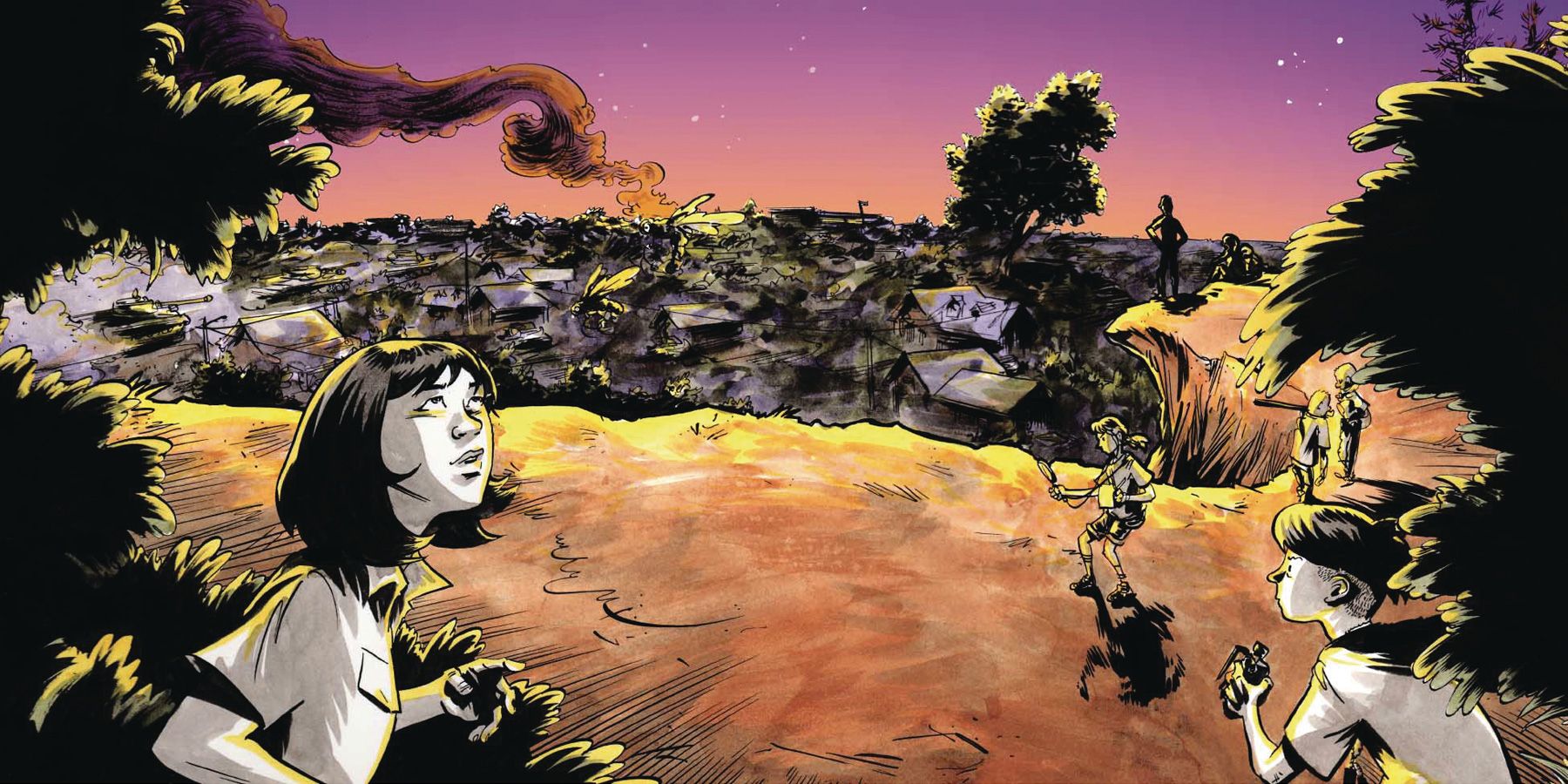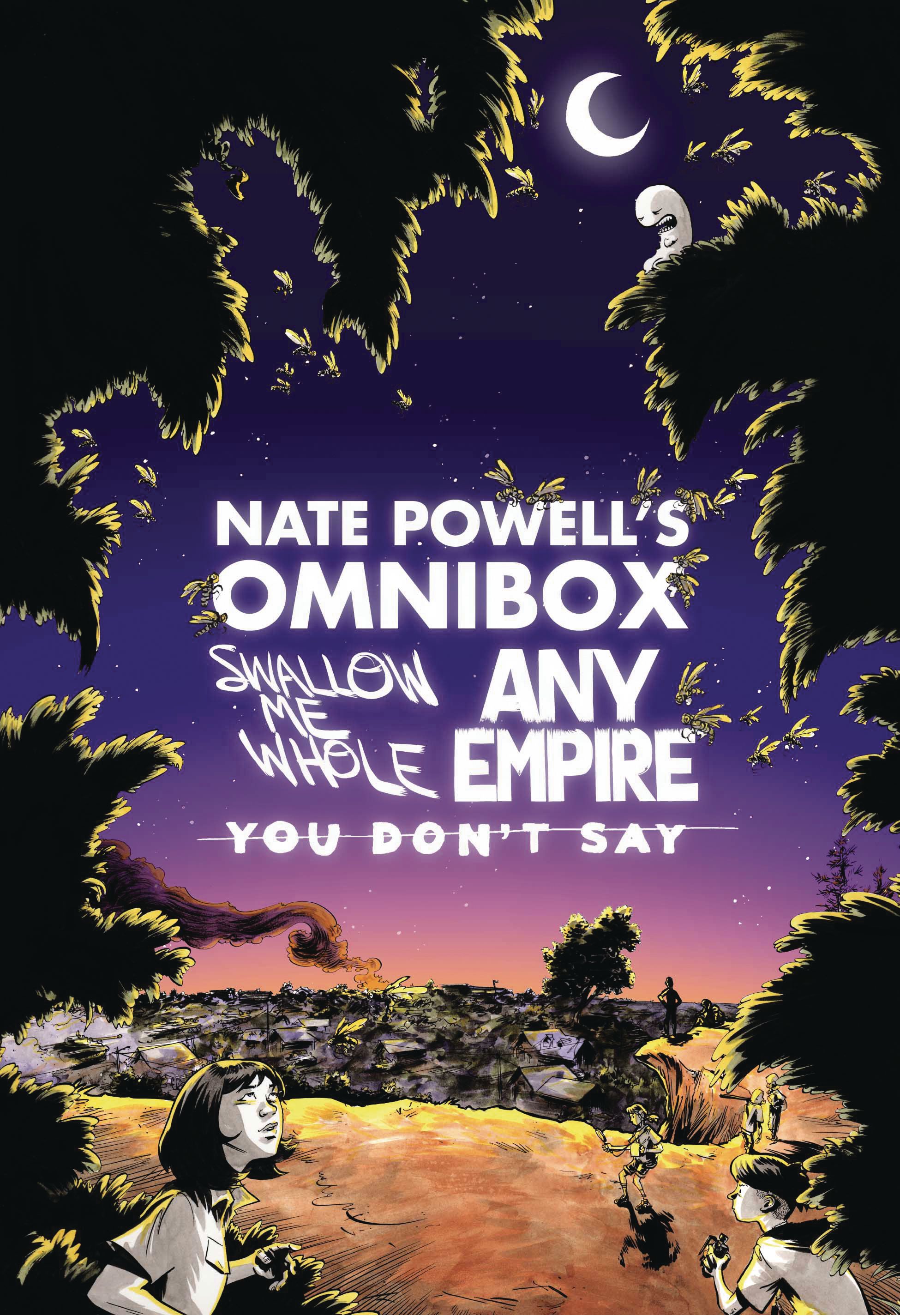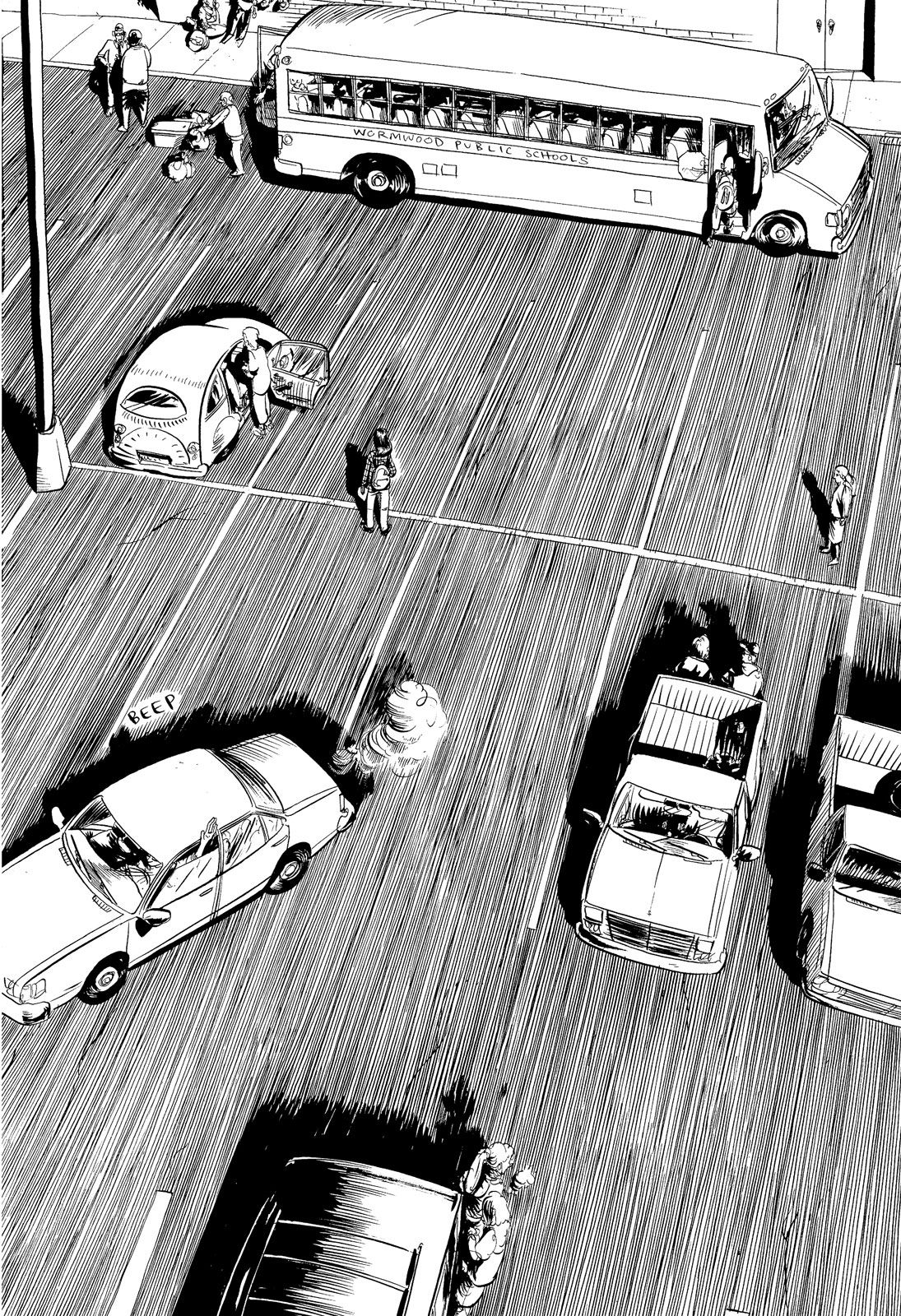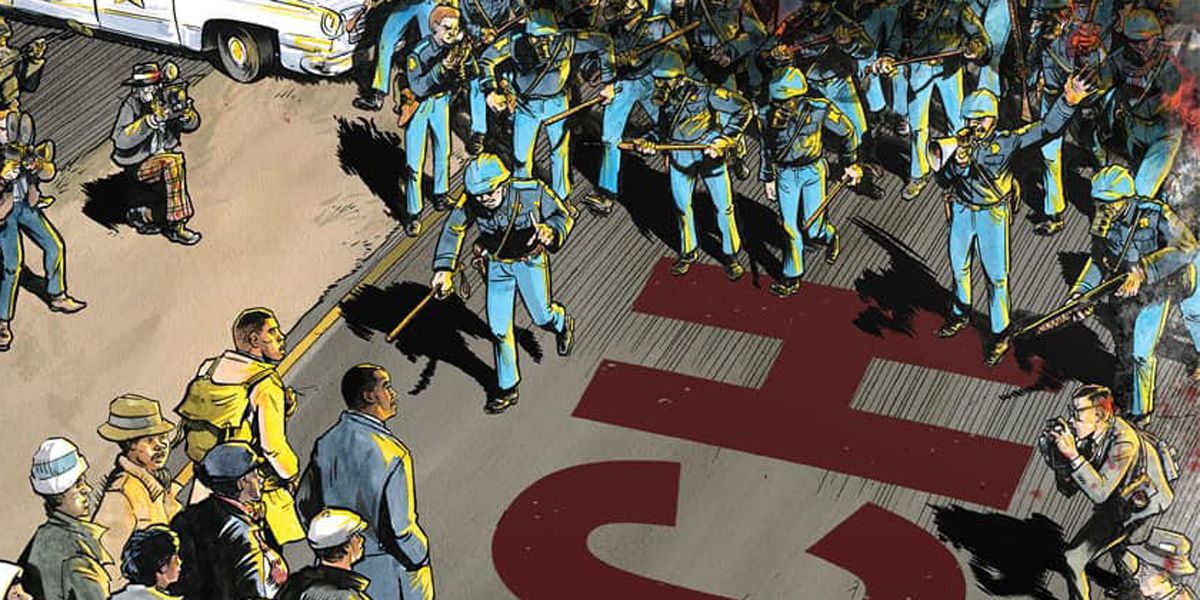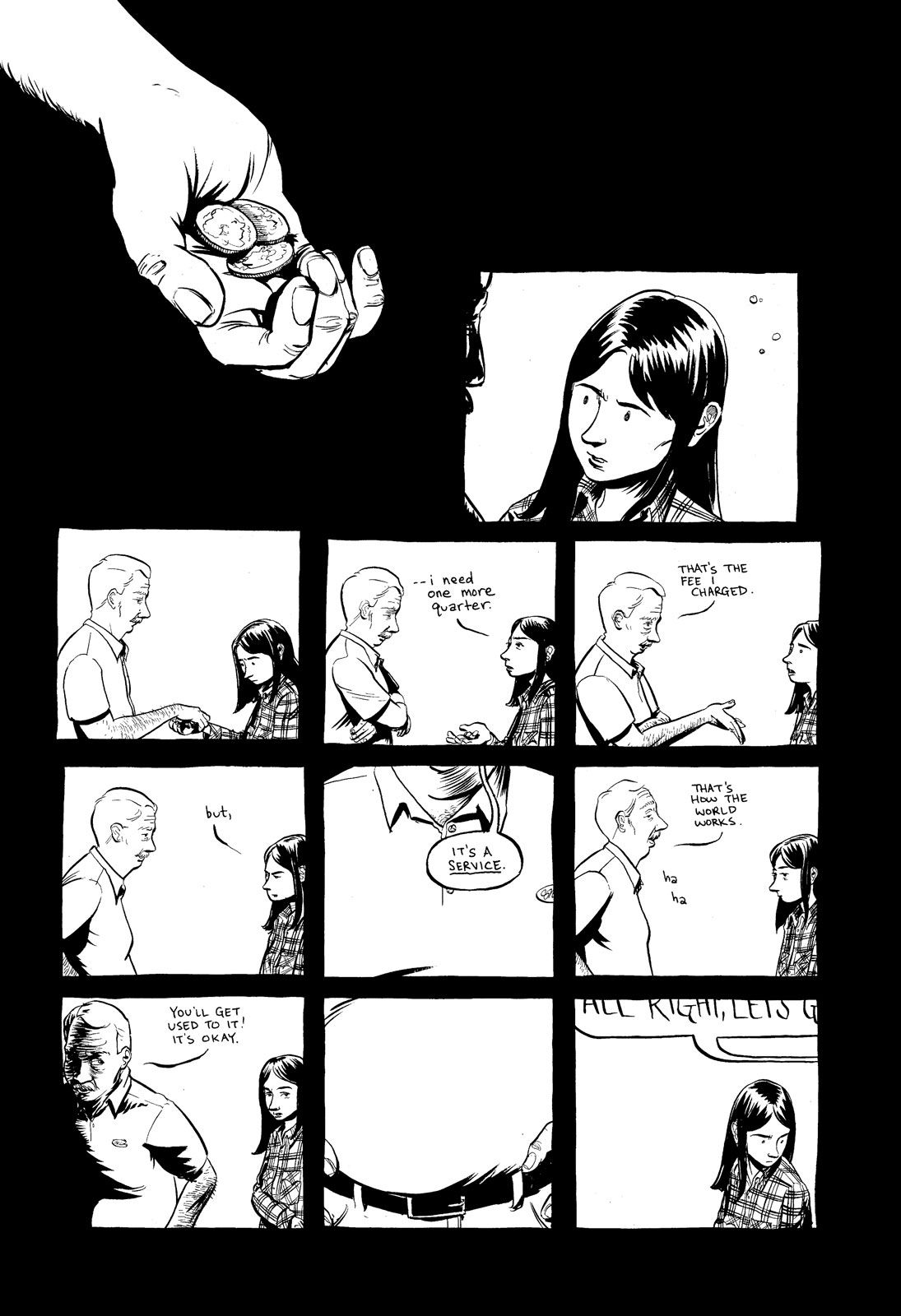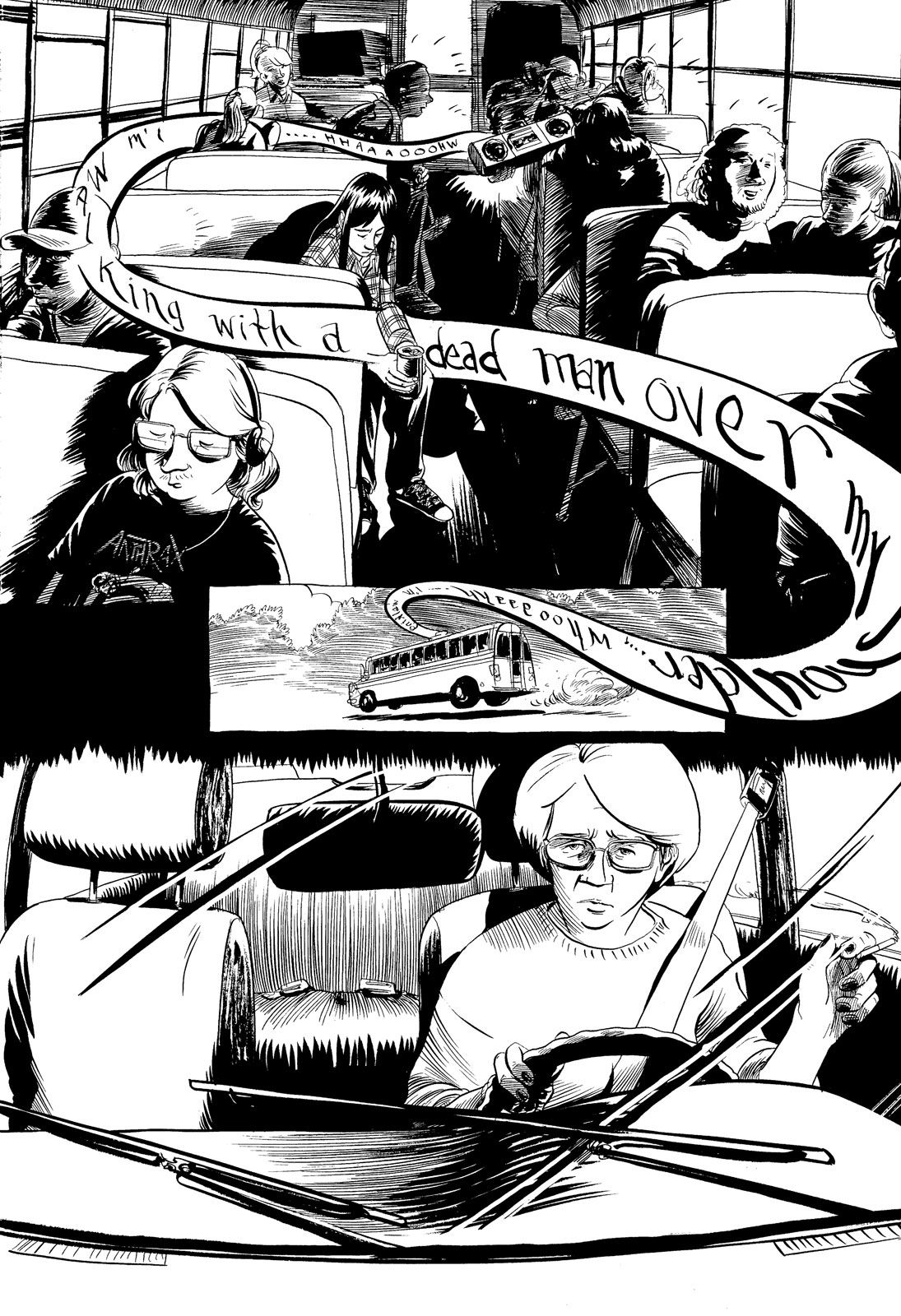Nate Powell is the only cartoonist to have received the National Book Award. The artist of March was awarded the prize in 2017 alongside Rep. John Lewis and Andrew Aydin, and Powell has traveled the country to talk about the book -- something that he continues to do and has tried to do more of this year.
Powell was an Eisner and Ignatz Award-winning cartoonist before March for his 2008 graphic novel Swallow Me Whole, and Top Shelf Productions has just released Omnibox, a collection of three of Powell’s books -- Swallow Me Whole and 2011 graphic novel Any Empire, plus the collection of his short comics, 2015's You Don’t Say.
RELATED: Necessary Trouble: The Importance of Rep. John Lewis’ March
Powell spoke with CBR about what’s he’s working on now, including a book he’s written and drawn scheduled for release from Top Shelf next year, another book the year after; with a few more planned, written by both him and others, in the years to come.
CBR: The books collected in Omnibox weren’t your first releases. I remember Tiny Giants and other comics you made before, but these books and Swallow Me Whole in particular I think is what comics people first knew you for.
Nate Powell: Absolutely. And of all the books I’ve ever done, Swallow Me Whole is still my baby above all others. It comes form a special place. It was the last story I ever did completely in a vacuum with no expectation that someone else would even publish it much less that people would read it or connect with it. It really stands at a creative and personal threshold for me.
For people who might have forgotten what the books are, or for people who only got to know you from March, do you want to say a little about them?
Swallow Me Whole is the story of two teenage step-siblings growing up in the South in a fictional Arkansan town called Wormwood. They’re each beginning to show symptoms of different mental disorders. They’re teenagers so they’re naturally just moving in different directions from each other, but at the same time they’re the only two people with whom they can really entrust sharing these very powerful frightening changes that are occurring in each of their lives. I think of it as a horror comic, but it’s also a relationship comic and it’s very thick with the environmental and cultural climate of the town and the way that families communicate or don’t communicate with each other.
It’s a horror story the way that Stand By Me or a lot of Ray Bradbury’s stories are horror.
Yes. Without a doubt.
Any Empire is fiction but 70 percent of it is a fictionalized processing of my life growing up as a G.I. Joe kid, growing up in a military family during the Reagan era at the end of the Cold war. Along the way developing an awareness of, and a means by which to question, what to me is very clearly a two-generation window -- the baby boomers and Generation X -- in which these nationalist militarist glory myths were totally cool. It’s funny, I haven’t really talked about Any Empire since we moved into the new regime. A year ago I would talk about it saying, looking back, I think history is going to be very unkind to those two generations and the ways in which we embraced this cartoonish nationalism as being a healthy normal part of life.
Look, I turned out fine -- most people turned out fine -- we all grew up surrounded by cartoon nationalist violence. I haven’t gotten to a point at which I’ve reckoned with what that means now that we’re entering into a very clear proto-fascist authoritarian, nationalist regime. I feel like our landscape is changing so quickly. I don’t know exactly how Any Empire holds up as a commentary on two generations of cultural exchange, particularly with middle-class American boys.
Yeah and having grown up in that, this new embrace of a cartoonist militaristic nationalism is very strange.
Without a doubt. There was an original version of Any Empire which I did. The book is about 300 pages long and I have an additional 200 pages that are pencilled and lettered and not inked. I went through a few different drafts of the book and this original version of Any Empire is radically different. It’s more of a smarmy, over the top political rant that’s a little more autobiographical. The book as published is a much better book and its shelf life will be much longer, but one of these days I’m going to ink those 200 pages. Oddly that inferior, rough, smarmy version of Any Empire predicted the world of 2016-17 back in 2008-9. I feel like I was so bogged down by the things I wanted to say about what I saw coming on the horizon that I lost sight of how to make this a story and what the center of the story actually was. Chris Staros is very helpful as an editor in being able to go, this is what I hear you saying, you need to do this for the narrative. At the time I lost some of these components which could have been prophetic -- in the most awful way possible.
We’ve talked a few times over the years and I was reading you before that and I think what really distinguishes your work, even before March, is how you’re thinking about and trying to deconstruct the ways we portray and think about violence.
It certainly became a more conscious decision, but also responsibility, in March. That was the first time I had to consider the real life subjects of physical violence in a comic I was drawing. It wasn’t until March literally put a living face on some of the folks depicted in the story that I wound up trying to reckon with our shared comic book history. The way we navigate visual depictions of violence using comics as a language in addition to a medium.
Whenever I do March talks I try to spend a little time addressing this. We’re all accustomed visual depictions of violence whether its in movies, TV, video games, comics; I think it all comes from the mid-century American comic book mode of communication. Once I made it through March Book Two, there wasn’t any going back. This new book I’m doing, Two Dead, with Van Jensen, is also based on some real life stuff that happened in my hometown of Little Rock in the '40s. I’m in the pencilling phase and after reckoning with those depictions of violence, it’s affecting my own means of telling what is in many ways a hard-boiled detective story. I feel like, yeah, there’s just no turning back after those years spent on March.
You cant draw it like Bogart getting punched in a movie or like Frank Miller.
Right! I certainly try, but there’s this voice that will not go away which requires rethinking all of my assumptions while I’m at the drawing table. Which cartoonists should be doing anyway. That’s what we should be doing. At least there’s a voice telling me to do my job and stay aware, even while I’m having fun with ink on paper.
So you had this comics career before March and you’re going to have this comics career after March, but after drawing this huge bestseller, winning the National Book Award, you’re never going to work on a project like this. It’s an odd place to be in.
I know. It’s weird. [Laughs] It is very true that those moments of recognition are profound. They’re very meaningful. March is very successful by comics standards. At the same time, I would guess for the vast majority of the people who read March, or at least March Book One, that’s the first graphic novel they’ve ever read. So it’s a victory any time I have the chance to get people’s attention or get other comics on people’s radar and just reminding them that there’s a reason why March works. It wasn’t despite being a comic, it was because it’s a comic.
At the same time, once I was done with March, I took a day off because I have three books I still have to do, and it was time to get back to work. It’s weird being a co-creator on a project where I’m not a fan of self-promotion, but at the same time, being such a believer in the mission statement and the history and the context behind March, it’s sort of unavoidable. If we’re lucky, for decades March will have a long healthy shelf life. It will stay in classrooms and libraries and stores and continue to, in some small way, move the dial of social thought in this country. Whether that’s something that lasts for three years or 30 years, we don’t know, but at a certain point it’s going to be me again at my drawing table with my two kids and my cat and trying to get groceries on the table and trying to tell stories that are meaningful.
A lot of those books will be books that sell 3,000 copies or 10,000 copies. It’s nice to be in this window right now where I’m a little bit comfortable as far as making ends meet is concerned and I’m able to work on super-weird personal stories that won’t have as high sales numbers but that are just as important to tell from a personal narrative perspective. I don’t know. It’s a relief to be like, okay, for the rest of my life until I die at the drawing table, it’s going to come down to me spending my days at this table listening to records and telling strange stories.
Yes, but you have a National Book Award hanging on the wall. [Laughs]
Well yes. [Laughs] I forget about that a lot. Then I’m like, okay, that was pretty amazing. [Laughs]
You mentioned that you’re working on a few projects. I know that one that’s been announced is Two Dead, which you’re doing with Van Jensen.
It’ll probably be out in 2019. There’s this new Simon and Schuster imprint called Gallery 13 that’s going to be putting it out. It’s a standalone graphic novel. It’s based on some bizarre, real life events that occurred in Little Rock in the 1940s involving organized crime, a highly segregated city and police force, deep psychological manipulation within the police department, the effects of PTSD and the effects of war on those who returned home. It’s only post-Vietnam that the cultural conversation accommodated speaking about PTSD in any kind of public forum. Van is a really perceptive, sensitive, thorough dude and he’s done a fantastic job weaving all of these things together and fictionalizing these real life events. Right now I’m a little over halfway done pencilling it and it should be out within two years. In the meantime right now I’m barreling through my own solo graphic novel called Come Again and that will be out hopefully next summer from Top Shelf.
Do you want to say anything about Come Again?
Come Again takes place in 1979. It’s in the same universe as Swallow Me Whole and Any Empire. I refer to it as the Wormwood universe, but it doesn’t take place in the town of Wormwood, where those other two books occurred. It takes place in the Ozarks in Northwest Arkansas in 1979 and it takes place with the remaining residents of an intentional hippie village which established itself in the late '60s. Ten years later as ideals and motivations change and as people straggle back to everyday life, this is the story of a few core families that remain. A lot of it is about privacy, and secrecy and intimacy. The difference between those things and also where they intersect, particularly in a living situation which requires openness. The village is founded on openness and sharing and a rejection of secrecy, but there’s still a very powerful natural human desire to find a space for these things.
A lot of it has to do with these relationship changes happening and changing priorities and what you do with your life when your ideals don’t line up with where your life is anymore. This story, more than anything else, is also a horror story. This has more of a Ray Bradbury scifi/horror feel like The October Country or Golden Apples of the Sun. Without giving away too much, there’s an ancient demon creature living deep within the hills that has its own agenda and has a long standing tradition of acquiring certain psychic capital -- and sometimes physical capital -- from people.
As you were describing it just now I kept thinking how much it feels like a companion to Any Empire and some of the ideas in there.
The characters actually cross over among all three of the books and Come Again, even though it’s the earliest of the three books, really connects all the dots. Some of the characters are unrecognizable until the end as being a part of the other two books. I definitely feel like it’s my way of reintroducing some questions and answering different questions that I was exploring in both Swallow Me Whole and Any Empire.
In the midst of all this, and especially considering life after March, I’m curious what you really want to do going forward. Do you want to focus more on your own work? More collaborations? More fiction? More nonfiction?
I have a couple years worth of projects lined up after I finish these two books. In general, I am personally not especially interested in telling nonfiction stories. It was interesting and transformative to become a part of the March team and develop a very powerful relationship to nonfiction comics through March. I like doing nonfiction with other writers, I’m just personally not that interested in telling those stories.
There are a couple of stories coming up. The book after Come Again is going to be largely about being in underground punk bands. It’s mostly going to be about eating, sleeping and driving together. Everything except actually playing the music, for the most part. A lot of that is going to be from my life, but I’m not interested in telling it as nonfiction. I do want to tell a story that’s basically about my relationship with my brother and growing up with somebody with autism in a era before the culture at large, but also the medical community, had an awareness of those things. Again, I’m not interested in telling it as a memoir or as nonfiction.
It is satisfying when people have nonfiction stories they want to tell. There’s a story that I’m pushing my wife Rachel to finish writing so we can do it together. We’ve done two stories in the past, which are both in You Don’t Say. They’re both straight nonfiction from her life. She’s an exceptional writer and she has such a great insight into these snippets of her own life that she’s been ruminating on for twenty years or whatever. I really like bringing other people’s personal accounts to life. I’m much less interested in telling my own. I’m doing another book with Cecil Castellucci. That’s going to be my first book that’s truly an all-ages book or kids book. I have a couple other collaborations vaguely lined up as soon as that’s done. My own books that I write and draw are at the core of why I make comics. Those stories are not the stories that pay the bills.
Comics are so interesting in the 21st century, because there are eight different ways to make a living as a cartoonist and none of them are easy, but some are radically different from each other. The way it has worked for me is doing my own books while simultaneously drawing someone else’s work for hire. In general I think my stories are just a little too out there to catch on in a broader way. I recognize that this is the formula which allows me to survive allows my kids to have groceries on the table. It’s a matter of staying disciplined and carving out enough time day after day to make both of those things happen simultaneously.
Nate Powell's Omnibox is on sale now from Top Shelf Productions.

